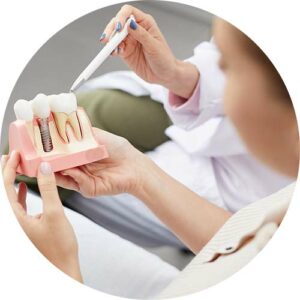About 89% of people with bulimia have signs that show up in the mouth. —National Eating Disorder Association
Dental health refers to all aspects of the health and functioning of your mouth, especially the gums and teeth. Aside from enabling you to speak, eat, and laugh, research shows that your teeth can speak volumes about your overall health. So while parents and guardians may be unaware that an eating disorder is occurring, they will usually take their children to the dentist at regular intervals, and this can be the catalyst for patients to get the help they need.
For this reason, dentists are often becoming the first line of defense when it comes to identifying possible eating disorders in their patients. The Center of Pediatric Dentistry instructs dental professionals to approach their patients in an effective and non-judgmental manner when talking to them about concerns regarding possible eating disorder behavior. It is also recommended that oral health professionals are aware of resources in the community if the patient discloses an eating disorder and a referral is necessary.
How Do Eating Disorders Damage Your Teeth?
Often patients with eating disorders are embarrassed to see their dentist because of oral issues they may be experiencing. Bad breath, sensitive teeth and tooth erosion are just a few of the signs that dentists use to determine whether a patient suffers from an eating disorder. For those with bulimia, harsh stomach acid from frequent vomiting wears away tooth enamel increasing the risk of tooth decay; and the effects of anorexia, especially the lack of nutrients consumed, can weaken the jaw bone which also weakens teeth and leads to tooth loss.
According to the Institute of Dental Research, 28% of bulimia cases are first diagnosed during a dental exam.
Dentists who detect patients with eating disorders may recommend therapists and teach the patients how to minimize the effects of purging. Dr. Stover instructs patients who are actively purging not to brush their teeth immediately after vomiting, as it can brush the acid deeper into teeth and gums.
“Strong stomach acids can soften tooth enamel, and by vigorously brushing, the tooth enamel may scratch causing further damage,” he says. “Instead, I advise patients to immediately rinse their mouths with regular tap water to help remove acids or rinse with an alcohol-free fluoride mouthwash, which will provide additional protection against stomach acids. Patients should wait at least an hour after purging before brushing their teeth.”
Signs of an Eating Disorder in the Mouth

By understanding the etiologies of eating disorders, recognizing the mouth warning signs, and intervening when appropriate, dental professionals can help the millions of Americans with these deadly diseases start down the road to recovery. According to the Institute of Dental Research, 28% of bulimia cases are first diagnosed during a dental exam.
A routine dental checkup can reveal oral signs of these diseases to a dental professional. Dentists are also able to tell if a person is relatively new or is a chronic purger. Some of the warning signs they look for include:
- Tooth decay
- Tooth enamel erosion
- Gum pain / bleeding gums
- Dry mouth
- Chronic sore throat
- Inflamed esophagus
- Tender mouth, throat, and salivary glands
- Teeth that are worn and appear almost translucent
- Palatal hemorrhages
- Decreased saliva production
- Enlarged parotid glands
- Problems swallowing
- Jaw alignment abnormalities
- Cracked lips
- Sensitive teeth
- Mouth sores
We Can Help
Intervention by loved ones, friends, and medical and dental professionals can spur someone to seek eating disorder treatment. Early detection of the disease may ensure a smoother and successful recovery period for the body and the teeth. Including a dentist in the health care team can help ensure that recovery is successful for the entire body. The key is to help direct individuals with an eating disorder in the direction of professional help, and that’s where The Meadows Ranch can make a difference.
The Meadows Ranch has treated eating disorders for more than 20 years. We know recovery from an eating disorder is possible. Based on feedback from patients, families and professionals, the vast majority of our patients remain committed to a life of health, balance and purpose.
For additional information about the treatment of eating disorders, please call to speak to an admissions coordinator.

